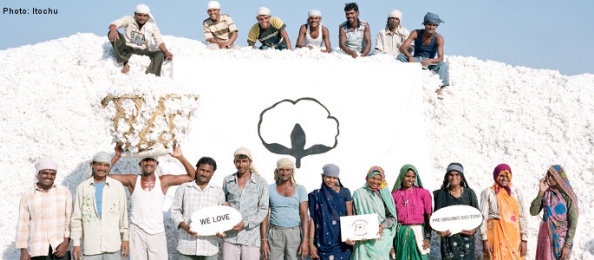Pre Organic Cotton Program: A Shift To Organic Farming
In September 2012, more than 150 delegates from corporations, international organizations, governments, and NGOs around the world gathered at Business, The MDGs and Beyond – a forum run as a side event to the UN General Assembly in New York. ITOCHU Corporation represented the Japanese corporations that are members of the UNDP-led Business Call to Action (BCtA) and spearheaded a panel at the first session, “Innovative Business Models for Sustainable Development.” At the forum, ITOCHU presented the Pre-Organic Cotton Program, an initiative of its Textile Company, which contributes to overall development in the cotton farming communities in India through poverty reduction and improvements in farmers’ health and the farming environment.
In 2007, managers at the Textile Company visited India, the world’s largest producer of organic cotton, to learn about local farming of organic cotton. By visiting local farmers, they came to understand the needs and issues associated with the production of organic cotton, which was then developed into an innovative business model not only for ITOCHU Corporation, but also for the textile industry.
Issues confronting cotton farmers in India
Since the green revolution in the 1960s, genetically modified seed, agrochemicals, and pesticides have been used in large quantities in India. It is said that 45 percent of all agrochemicals consumed in India are used for cotton farming, yet cotton fields account for a mere 5 percent of all farmland in India. The purchasing of chemicals and pesticides poses an economically heavy burden on impoverished cotton farmers. Moreover, since many of them are not equipped with appropriate protective gear for handling chemicals on their farms, skin and respiratory diseases are common. The safety of drinking water is also a concern, since farmers depend on wells near cotton fields where agrochemicals are used. For decades, despite these negative impacts, it was commonly used as the most efficient way of farming.
India accounts for nearly 70 percent of total world production of organic cotton, yet organically grown cotton accounts for only 1 percent of all cotton cultivated in India. The issues confronting farmers provide the context for the low numbers of farmers shifting to organic farming.
| Initiator | Itochu |
| Project start | 2007 |
| Status | ongoing |
| Region | India |
| Contact person | |
| Awards |
Project benefit
- Improving living conditions of farmers
- Environment-friendly cultivation of cotton
| Anti-Corruption | - |
| Business & Peace | - |
| Development | X |
| Environment | - |
| Financial Markets | - |
| Implementing UNGC Principles in your Corporate CSR Management | - |
| Human Rights | - |
| Labour Standards | - |
| Local Networks | - |
| Advocacy of global issues | - |
| Business opportunities in low income communities/countries | X |
| Project funding | - |
| Provision of goods | - |
| Provision of services/personal | X |
| Standards and guidelines development | - |
Most cotton farmers could not wait the three years required for their farmland to be certified as organic and to receive financial and health benefits. During this period, farmers usually experience a 20 to 30 percent decrease in crop yields. In addition, they are unable to sell the organically produced crops at higher prices due to the lack of certification. In addition to lost revenue, the certification process requires additional fees that are prohibitive for many farmers. Thus, switching to organic cotton cultivation is no easy matter for those farmers who have been farming conventionally for years.
From identifying issues to creating initiatives
Conventional cotton and organic cotton are well known to the world; however, the transitional period to organic and the producers’ living situations during that period is rarely recognized. In the first few years of organic farming, cotton production will usually be unstable, because of the rapid change in farming methods. Also, transitional cotton will be sold as conventional cotton, even when it is produced using the organic method. Recognizing this situation, ITOCHU realized that drawing attention to this little-known reality has the potential to greatly change awareness in the textile industry.
As a solution for improving the living conditions of cotton farmers, ITOCHU Corporation conceived a system called the Pre-Organic Cotton Program with kurkku, a company that promotes sustainable lifestyles by selling eco-friendly products. Initiated in 2008, this program puts value on the cotton that is grown without the use of agrochemicals or chemical pesticides during the transition period. The main supports for the program include (1) undertaking purchase guarantees in volume before seeding, (2) providing organic farming education to farmers, and (3) helping farmers to get their land certified. This scheme reduces the economic burden on farmers, since they no longer need to purchase agrochemicals and pesticides. At present, more than 40 apparel brands that are eco-friendly and conscious about product origin use Pre-Organic Cotton as the key material for cotton products such as clothing, towels, and bedding.

“Companies such as ITOCHU and kurkku demonstrate the potential of innovative business partnerships to generate value for companies as well as communities. This new commitment to the BCtA, the first in recent years by a company from Japan, supports environmentally sustainable agriculture while at the same time increasing income for farmers in India.”
Sahba Sobhani BCtA Acting Program Manager
Commitment to the Business Call to Action
Today, the private sector is expected to have a substantial impact on the development agenda of the UN through business. For example, it is possible to achieve sustainable development through “inclusive business” by fairly engaging people in developing countries as producers and business partners in the value chain.
In August 2012, the Pre-Organic Cotton Program was approved by the BCtA, which is led by the UNDP. The BCtA is a global initiative to encourage the private sector to develop innovative business models that achieve both commercial success and sustainable development. It is organized by several international organizations, including the UNDP. As part of its commitment to BCtA, ITOCHU pledged to improve the economic conditions, health, and farming environment of low-income farmers in India by increasing the number of participating farmers and fields in the Pre-Organic Cotton Program.
Contributing by connecting people with the world
So why is ITOCHU Corporation involved with the Pre-Organic Cotton Program? Because it believes the program has the power to connect people, and because the program brings happiness and positive sustainable changes for those involved – from service providers to consumers around the world.
Through this program, ITOCHU hopes that people become more aware of the issues surrounding the poorest segments of the population. It believes that consumers of Pre-Organic Cotton products will pay greater attention to the social issues surrounding the farmers in developing countries. By increasing both production and consumption of Pre-Organic Cotton, ITOCHU hopes that more cotton farmers will switch to organic farming to improve living conditions and the natural environment. This is why it continues to support the expansion of the Pre-Organic Cotton Program.
Unique to Japan, a general trading company such as ITOCHU – with its multi-faceted corporate activities in regions around the world and its extensive areas of operations – has both the potential and the responsibility to contribute to countries and society by connecting people and building bridges among different segments.
ITOCHU believes that corporate social responsibility lies in corporate thinking and action on the question of how to play a role in building sustainable societies through business activities. As a leading Japanese company, ITOCHU is making rapid progress by expanding businesses that respect every stakeholder, including cotton growers. The company remains determined to provide wealth and happiness to people around the world.
This project description was originally presented in the Global Compact International Yearbook 2013.
About ITOCHU:
The history of ITOCHU Corporation dates back to 1858 when the Company's founder Chubei Itoh commenced linen trading operations. Since then, ITOCHU has evolved and grown over 150 years.
ITOCHU operates its business in accordance with the ITOCHU Group Corporate Philosophy and Code of Conduct. The fundamental policy is to work toward the long-term preservation and enhancement of their corporate value by building positive and effective relationships with their stakeholders. To execute the business activities in a fair and efficient manner in accordance with the fundamental policy, they are increasing the transparency of the decision-making process and constructing a corporate governance system that incorporates appropriate monitoring and supervisory functions.
Write a comment about this page
Your comments are provided by your own free will and you take sole responsibility for any direct or indirect liability. In order to maintain the highest discussion quality, all comments will be reviewed by our editors. You hereby provide us with an irrevocable, unlimited, and global license for no consideration to use, reuse, delete or publish comments in accordance with our Community Guidelines.
About Us // Privacy Policy // Copyright Information // Legal Disclaimer // Contact
Copyright © 2012-2018 macondo publishing GmbH. All rights reserved.
The CSR Academy is an independent learning platform of the macondo publishing group.









